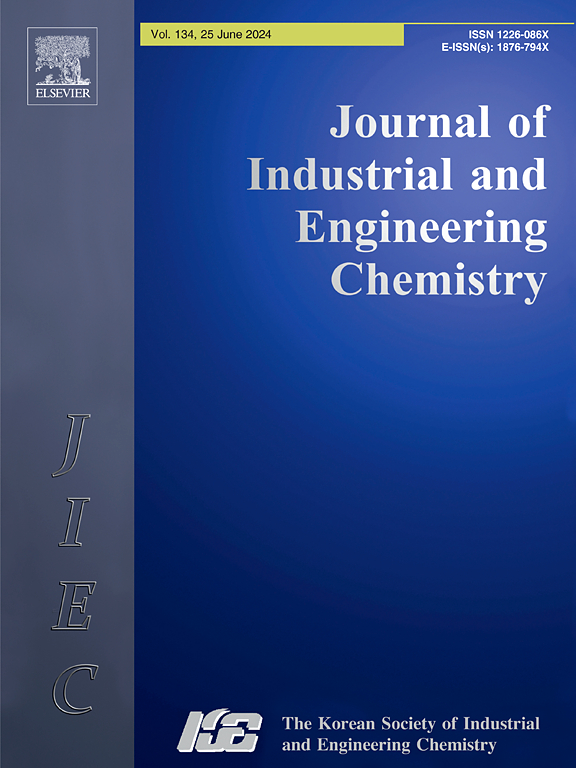Pilot-scale testing of a multi-tube type falling film distillation column equipped with a biphasic thermosyphon as a new alternative for the desalination of brackish water and seawater
IF 5.9
3区 工程技术
Q1 CHEMISTRY, MULTIDISCIPLINARY
Journal of Industrial and Engineering Chemistry
Pub Date : 2024-08-30
DOI:10.1016/j.jiec.2024.08.044
引用次数: 0
Abstract
This paper proposes an innovative technology for desalinating brackish water and seawater using a multi-tube type falling film distillation column integrated with a biphasic thermosyphon. Based on the literature survey, this proposal has not been previously explored. In this study, the viability of the pilot-scale application of this technology for desalination was tested, and the process performance was evaluated in terms of distillate flow rate, salinity removal, and energy consumption, considering different experimental conditions. Synthetic solutions containing 10.0 and 35.0 g/L of sodium chloride were used to simulate brackish water and seawater salinities, respectively. The thermal desalination pilot plant integrating a compact falling film distillation column and a biphasic thermosyphon demonstrated high effectiveness, consistently producing desalinated water with a conductivity below 10 μS cm. Considering both concentrations, the optimal condition for desalinated water production was a feed temperature of 85 °C, a vapor chamber temperature of 121 °C, and an energy consumption of 16 kW. This new technological option’s energy consumption is approximately 33 % lower than that of a simulated flash distillation column operating under similar conditions. In conclusion, this study presents promising results, establishing falling film distillation technology as a viable alternative for desalinating brackish water and seawater.对配备双相热流器的多管式降膜蒸馏塔进行中试规模测试,以此作为苦咸水和海水淡化的新替代方案
本文提出了一种利用多管式降膜式蒸馏塔与双相热流器相结合来淡化苦咸水和海水的创新技术。根据文献调查,这一建议以前从未被探讨过。本研究测试了该技术在海水淡化中试规模应用的可行性,并根据不同的实验条件,从蒸馏物流速、盐度去除率和能耗等方面评估了工艺性能。合成溶液中分别含有 10.0 和 35.0 克/升的氯化钠,用于模拟苦咸水和海水的盐度。集成了紧凑型降膜蒸馏塔和双相热吸附器的热淡化中试设备表现出很高的效率,能稳定地生产出电导率低于 10 μS cm 的淡化水。考虑到两种浓度,生产淡化水的最佳条件是进水温度为 85 °C,蒸汽室温度为 121 °C,能耗为 16 千瓦。这种新技术方案的能耗比模拟闪蒸塔在类似条件下的能耗低约 33%。总之,这项研究取得了可喜的成果,将降膜式蒸馏技术确立为淡化苦咸水和海水的可行替代技术。
本文章由计算机程序翻译,如有差异,请以英文原文为准。
求助全文
约1分钟内获得全文
求助全文
来源期刊
CiteScore
10.40
自引率
6.60%
发文量
639
审稿时长
29 days
期刊介绍:
Journal of Industrial and Engineering Chemistry is published monthly in English by the Korean Society of Industrial and Engineering Chemistry. JIEC brings together multidisciplinary interests in one journal and is to disseminate information on all aspects of research and development in industrial and engineering chemistry. Contributions in the form of research articles, short communications, notes and reviews are considered for publication. The editors welcome original contributions that have not been and are not to be published elsewhere. Instruction to authors and a manuscript submissions form are printed at the end of each issue. Bulk reprints of individual articles can be ordered. This publication is partially supported by Korea Research Foundation and the Korean Federation of Science and Technology Societies.

 求助内容:
求助内容: 应助结果提醒方式:
应助结果提醒方式:


